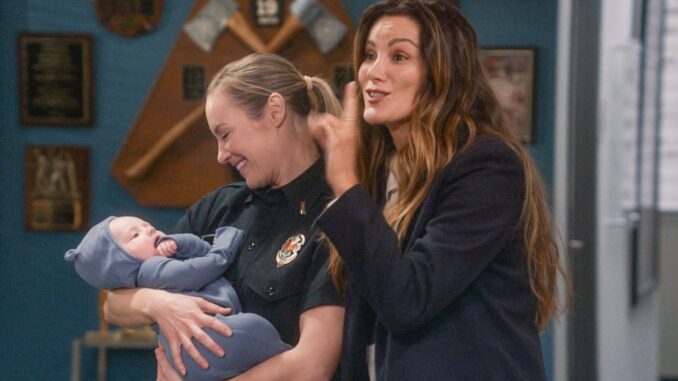
The final credits roll, the sets are struck, and the narrative threads, once taut with anticipation, gently slacken into memory. For fans of Station 19, the departure of their beloved Seattle firefighters has left a void, a silent station where once sirens wailed and heroes strode. Yet, amidst this quiet, a familiar voice rings out with an unwavering promise: Danielle Savre, the formidable actress behind Maya Bishop, declares her readiness to return “anytime.” This isn’t merely a professional courtesy; it’s a testament to the profound connection between actor and character, the enduring power of a meticulously crafted narrative, and the fervent hope that some stories are simply too vital to fade away.
To understand the weight of Savre’s declaration, one must first revisit the extraordinary journey of Maya Bishop. Introduced as the fiercely disciplined, almost stoic lieutenant, Maya was a character whose initial rigidity could be mistaken for coldness. A former Olympic athlete, she approached firefighting with the same unyielding drive, often at the expense of her own emotional well-being and the comfort of her peers. Yet, over seven seasons, Danielle Savre meticulously peeled back these layers, revealing a woman of immense complexity: vulnerable, deeply flawed, incredibly resilient, and capable of profound love. From the ambition that propelled her to captaincy to the crushing fall from grace, the struggles with mental health exacerbated by a demanding, often traumatic job, and the arduous path to motherhood, Maya’s arc was a masterclass in character development. Savre’s performance allowed us to witness not just a firefighter, but a human being grappling with the very essence of self-worth, the scars of a demanding past, and the daunting task of building a family forged in unwavering love.
This deep connection is precisely what makes Savre’s “anytime” so resonant. It speaks to an actor who didn’t just play a role, but truly embodied it. Savre brought a visceral authenticity to Maya, whether she was barking orders on a fire ground, navigating the tender intimacy of her relationship with Carina DeLuca, or confronting the raw anguish of her past. Every flicker of doubt, every gleam of determination, every tear of anguish felt earned, deeply felt, and utterly real. For Savre, Maya Bishop transcended the boundaries of a job; she became a part of her artistic and personal landscape. Her readiness to step back into Maya’s boots signifies a belief that the character still has stories to tell, lessons to impart, and growth yet to achieve, even if the primary vehicle for those narratives has concluded. It’s an artist’s commitment to a creation that has taken root not just in her own psyche, but in the hearts of millions.
Beyond the individual journey, Maya Bishop, through Savre’s portrayal, became a beacon of representation and hope. Her relationship with Carina, affectionately dubbed “Marina” by fans, blossomed into one of television’s most beloved and significant LGBTQ+ couples. Their love story wasn’t merely a subplot; it was an anchor, illustrating the power of unwavering support, the challenges of navigating a demanding life alongside a partner, and the beauty of building a family outside conventional norms. For countless viewers, Maya and Carina offered a reflection of their own experiences, a validation of their love, and a vision of strength and tenderness that resonated deeply. Savre’s willingness to return, therefore, isn’t just about Maya; it’s about the continuation of this vital representation, the enduring power of Marina’s legacy, and the potential to revisit a relationship that has profoundly impacted popular culture.
The word “anytime” hangs in the air, a whisper of possibility in the quiet aftermath of a show’s end. It’s a promise that Maya Bishop is not simply a character archived in a streaming library, but a living entity, ready to spring forth should the call arise. Whether this means a guest appearance in a spin-off, a special reunion movie, or simply the acknowledgment that some characters live on indefinitely in the minds of their creators and fans, Savre’s statement is a comforting assurance. It speaks to the enduring magic of storytelling, where the lines between fiction and reality can blur, and the impact of a character can transcend the screen.
Danielle Savre’s readiness to return as Maya Bishop isn’t just news; it’s an illustrative essay in itself on the profound alchemy that occurs when an actor fully inhabits a role, creating a character so rich and resonant that she refuses to be forgotten. It’s a tribute to Maya’s journey from an “ice queen” to a fiercely loving, vulnerable, and inspiring woman. It’s a testament to the enduring power of representation, and above all, it’s a beacon of hope for fans who, like Savre herself, know that some stories, and some heroes, deserve to live on, “anytime.”